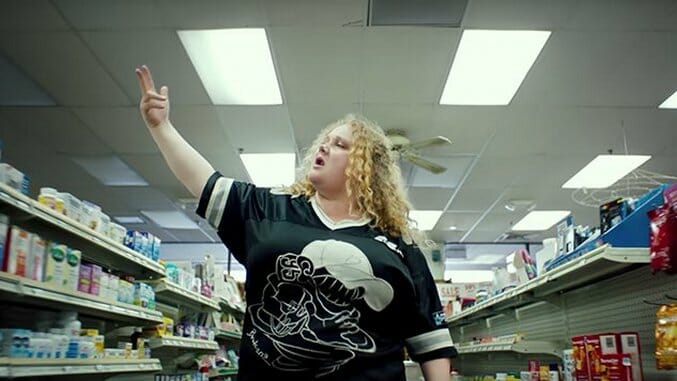Patti Cake$

Coming-of-age tale Patti Cake$ would be overwhelmed by its quirks if it weren’t constructed of them. An overweight white battle rapper and bartender, Patricia (Danielle Macdonald), seeks the escape from New Jersey and her family (singer/burnout mother Barb, played by Bridget Everett, and grandmother, played by Cathy Moriarty) that fame and fortune could provide her. The most interesting part of this played-out tale is that its musical genre—even within the greater genre of aspirational musician movies—fits so well with its motivations. Rap (at least the rap in which Patricia is interested) is built upon bravado and escapism; the film’s brushes with dream imagery and stylistic edginess only make its narrative shortcoming more disappointing.
Patti Cake$ cannot distance itself from the superior 8 Mile no matter how often it returns to the shallow differentiation of its portly female rapper. Rap—and the entertainment industry in general—is toxic towards its beautiful, skinny women. Any other body type? Good luck. Patti Cake$ takes its star’s disadvantages in this patriarchal structure and does even less with them than it does with its acknowledged problem of a white girl idolizing and (as her African American rap idol later accuses her of in the film) scavenging a culture that does not belong to her. Uncomplicated, the film brushes past too many thorny, complicated topics for it not to expect an audience’s attention to snag onto one of them.
Instead, it focuses on the ragtag group of friends and musicians Patricia (going by stage names Patti Cake$ and Killa P at different times) assembles to reach her dream. This crew, collectively known as PBNJ, helps Patti move from parking lot rap battles to recording singles and playing shows.
There’s her one friend Jheri (Siddharth Dhananjay), who works as both hype man and R&B wannabe. There’s Basterd (Mamoudou Athie), who is perhaps cinema’s first black metal Magical Negro thanks to his underwritten character and penchant for solving every problem Patti runs into. Patti speaks to Basterd (whose real name is Bob, a taste of the film’s sense of humor) like a child, her tone altering completely to a patronizing coo. Making this choice even odder, a romance springs up between the two (almost directly after Patti is lambasted by her idol), giving her the black approval of her art previously denied to her, only now with a weird, unearned sexual underpinning.
-

-

-

-

-

-

-

-

-

-

-

-

-

-

-

-

-

-

-

-

-

-

-

-

-

-

-

-

-

-

-

-

-

-

-

-

-

-

-

-








































